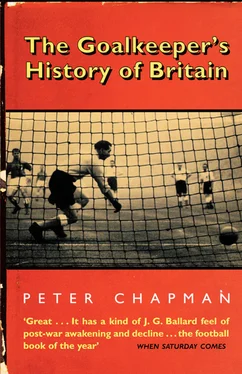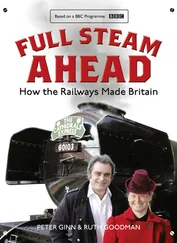England went to Brazil in keeping with the new spirit of international cooperation and comradeship. Having fought with, or against, each other we had to live together, rather than, as after the First World War, retiring to our respective corners, in effect to prepare for the next conflict. Something else had also begun to gnaw away at us. There was no need to announce it to everyone, but perhaps we had something to prove. The World Cup was creating an alternative pole of development which others might come to regard (wrong though they would be) as the true yardstick of greatness. We wouldn’t have been wrong to stay away, but would not have wished our actions to be misinterpreted as shirking a challenge.
When England turned up in Rio de Janeiro in June 1950 they were greeted as the ‘kings of football’. The arrival of the inventors of the game was an endorsement of the competition. The England party regarded it less seriously. Most arrived ten days before the competition’s start, allowing little time for the players to acclimatise. Their first game was to be with Chile in the coastal humidity of Rio, the next against the United States in the rarefied mountain air of Belo Horizonte. Four players, leading lights like Stanley Matthews among them, came via a post-season tour of Canada and arrived just three days before the opening match.
Conditions confirmed the party’s suspicions of what living abroad must be like. From a country blessed with the Broadstairs and Blackpool B&B, the players were scathing of their hotel on Rio’s Copacabana beachfront. Egg and bacon breakfasts were obtainable, but served in black oil, not wholesome melted lard. Players survived on bananas, risky in itself. When the first bananas, not seen since the 1930s, arrived in Britain after the war, there had been reports that a young girl of three had overdosed and died eating four of them. Alf Ramsey was the first to go down with a bad stomach, a bilious episode that was to colour Anglo-Latin American relations on and off for the next thirty or forty years. English pressmen on the trip also warned against whom, not just what, you could trust. The players were urged not to give autographs. Some Brazilians had, only to find they’d signed subversive ‘communist’ petitions.
The first game before a thin crowd of 40,000 at the Maracanã stadium (capacity 110,000) saw England players suffer from the surprisingly thick air. They gulped from a cylinder of oxygen at half-time. Surprisingly, in a foreign land, rain then fell to make conditions a little more familiar and a 2–0 win was scratched out of a patchy performance. The manager, Walter Winterbottom, and captain, Billy Wright, thought there should be changes for the second game against the USA, but the decision was in the hands of the one selector on the trip, the Neville Chamberlain look-alike Arthur Drewry. He chose to change nothing. The USA was a small footballing nation about which we knew and cared little. Thus, he waved his sheet of paper with the England line-up before an expectant world. There were to be no changes; a case of peace in our team.
Other factors were also blamed for England’s subsequent performance. The stadium at Belo Horizonte had been built for the World Cup but was a rickety structure. With a capacity of only 20,000, it summed up the players’ feelings that this was not a serious competition. The surface, recently laid, was a scrubby desert of tufts of tall grass, interspersed with bare earth. Any of the 111 pitches just created from the east London rubbish dump at Hackney Marshes-with so many posts and crossbars it had caused a national shortage of white paint – might have been better.
Neither could the USA be regarded as serious combatants. One of their better players was a Scot named McIlveney, who’d played in Wales but, after seven games for Wrexham in the Third Division North, had been given a free transfer and emigrated. Keeper Borghi’s first sporting love was baseball. The centre-forward Joe Gaetjens was from Haiti, a place few had heard of except in lurid discussions about voodoo. Several of the US team took the field in a zombified state. Imagining they would have little to celebrate after the match, they’d stayed up to party through the night before.
Surreal forces, whether brought to bear by Haitian Gaetjens or not, played no minor part. When England’s forwards prepared to shoot, the ball stood up on the long tufts of grass, to be scooped, with uncanny regularity, high over Borghi’s bar. No one was quite certain what magic fashioned the USA’s winning goal. Bert Williams appeared to have a shot from the left covered but Gaetjens somehow got to it with the faintest of headed deflections. People wondered, had he touched it at all?
The British press hit upon the analogy of the defeat at Gallipoli in the First World War to convey how England had been routed in distant parts. When a loss to Spain meant ejection from the tournament, Dunkirk was the obvious parallel. Britain’s first expeditionary force to a World Cup rapidly evacuated hostile territory, the instinct of the England team, officials and the press to get away as quickly as possible, back to the safety of home. They didn’t stay to study the form of those who remained in the competition and missed the eventual final between Brazil and Uruguay. The view was that there was nothing to be learned from places where the conditions for football were never right, nor from the teams which played there. If they weren’t out-and-out cheats (the Football Association toyed for a while with the idea of protesting that the US team had contained ineligible non-Americans), then they were as good as. An official report darkly pointed to how the Brazilians had cancelled all league matches for months before the competition. The Uruguayans had been together for no less than two years. This was typical of such people. They got together in darkened rooms to concoct their plans. If that won them games, well, it showed what a state the world was in. Doubtless in the estimation of Monsieur Rimet, Uruguay’s victory in the final was magnifique, but it wasn’t football.
What did the World Cup mean, anyway? ‘Even if we’d have won it,’ said Stanley Matthews, ‘the public would have said it was “just another cup”.’ What had happened was in a remote part of the globe. Unlikely defeats had happened before in those sorts of places, where climatic and other quirks allowed Johnny Foreigner his occasional day. Losing to the USA at football was as humiliating as Gordon going down to the ‘mad Mahdi’ and his whirling dervishes at Khartoum. That had been in the desert. The pitch at Belo Horizonte was much the same and the Americans had played like a team possessed. But it was also distantly forgettable. It wouldn’t happen at home. England turned back on itself from its failed beachhead in Brazil, bruised and ready to draw its line in the sand.
The assault began almost immediately, in the irregular shape of Marshall Tito’s ‘partizans’, with Yugoslavia’s visit in the late autumn. Yugo-, or Jugoslavia as it was often written, had beaten England 2–1 in Belgrade before the war, one of their players rugby-tackling an England forward in the penalty area to prevent an equaliser. The war had confirmed Tito and his mountain men as a belligerent bunch. The British soldiers called them the ‘Jugs’, which rhymed with ‘mugs’ and sounded funny. But the Jugs were definitely no mugs. When the British forces were based there during the stand-off over Trieste, anyone tempted to go looking for wine and women in the hills behind Gorizia was in serious danger of never coming back. Partizans came down into Trieste, marched off groups of Italians and shot them. A stealthy band paddled across from their Slovenian haven to my dad’s camp around the bay one night and removed and made off with the tyres of seventeen jeeps. Now the Yugoslavs came from the depths of Serbia and Montenegro to the dim hinterland of Hornsey Road to snatch a 2–2 result at Highbury. Thus, Islington, and a site but a mile up Upper Street, and through Highbury Fields from our street, took its place in history: it saw the first draw by a foreign team on English soil.
Читать дальше












